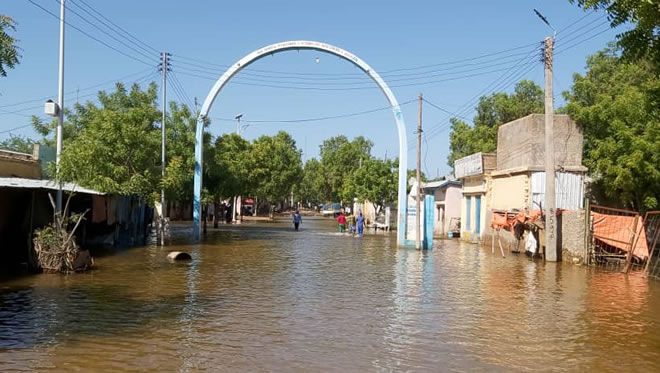

Climate change is the cause of deadly flooding year after year in Beledweyn, Central Somalia - Photo Hiiraan Online
 By Ben Fender and Damon Bristow
By Ben Fender and Damon Bristow
Wednesday, June 17, 2020
It is a quarter of a century since the UN first proposed a special day to call for action to address the causes and effects of drought.
Sadly, in that time, the problems have only got worse.
In Somalia, extremes of climate are now more common. Serious droughts – like those in 2011 and 2017 – happen once every few years rather than once a decade. Major floods are also more frequent. Today, the challenge for many Somalis is not just how to deal with one shock but a series, one after the other.
Many communities are still recovering from delayed gu rains in 2019 that harmed both livestock and crops. This year we have again seen floods, which have affected over 900,000 Somalis, as well as swarms of desert locusts, which have damaged over 70,000 hectares of land in Somalia and neighboring Ethiopia. And of course COVID19 is affecting the whole country.
The locust swarms - worse than usual this year because of a cyclone in the Arabian Sea and abnormal rainfall - are expected to reduce the gu harvest by 25% -which is the equivalent of six months of food for over 400,000 people. The UK has worked with the UN Food & Agriculture Organisation to combat these swarms, but as they move into parts of the country that are less accessible, aerial crop spraying is not always possible.
This year’s floods in Southern Puntland, Hirshabelle, Somaliland and elsewhere have displaced 412,000 people, and affected 918,000. Many of those displaced are having to uproot their lives for a second time – leaving some without any source of income or shelter. We have been providing emergency supplies and essential services to some of the communities hardest hit.
COVID19 is also affecting the ability of families and communities to cope. Families are seeing a reduction in remittances from overseas of 30-50%. These are a mainstay for many. Restrictions on markets or movement and social distancing measures have also made life harder for those who rely on casual labour.
The UK and Switzerland have called for greater global collaboration to make sure diaspora communities around the world can continue to send financial support to their families. We are also taking steps to make it easier for Somalis in the UK to continue making payments and for money transfer operators to transfer the cash. But there is more to do.
As the country’s second largest humanitarian donor, the UK will always stand by Somalis in need. But nothing is more frustrating than to see crises occur year after year. That is why we devote most of our effort to help communities become more resilient to shocks – and to address the underlying causes of climate change.
For example, we are helping over 200 communities to become more resilient by income generating activities, restoring water infrastructure, and providing remote healthcare. And we have championed debt relief for Somalia. This is now unlocking major investments by the World Bank in sectors like water, health and education.
At the same time, we must do everything we can to stop the rise in global temperatures, which is the root cause of so many of the recent natural disasters. We need governments across the world to be more ambitious in cutting carbon emissions, so that vulnerable countries do not suffer.
In November 2021, the UK will host ‘COP26’, the UN’s global climate talks, in close partnership with Italy. The stakes are higher than ever. We are working with the Somali government to ensure that Somalia’s voice is heard, and that Somalia gets the support it needs to adapt to the changing climate.
Today, as we mark this World Day, let us redouble our efforts.
Ben Fender is the British Ambassador to Somalia and Damon Bristow is the Head of DFID Somalia